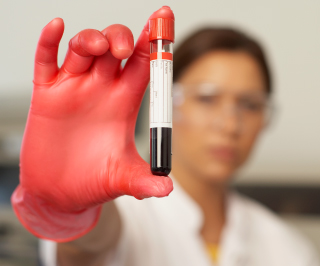
Image Credit: Thinkstock Images / Stockbyte / Thinkstock
A liquid biopsy test developed by an international consortium of researchers leverages DNA and proteins to identify eight types of cancer in their early stages. Researchers reported their findings online in Science. The CancerSEEK multianalyte test detects circulating tumor DNA (ctNDA) in the blood, simultaneously evaluating the protein levels of eight cancer types that account for 60% of cancer deaths in the United States. These include colorectal, lung, and breast cancers, and five more—ovarian, liver, stomach, pancreatic and esophageal—that currently have no screening test.
“Circulating tumor DNA mutations can be highly specific markers for cancer. To capitalize on this inherent specificity, we sought to develop a small yet robust panel that could detect at least one mutation in the vast majority of cancers,” said Joshua Cohen, an MD, PhD student at the Johns Hopkins University School of Medicine and the paper’s first author, in a statement. To develop the test, the researchers looked at hundreds of genes and 40 protein markers, eventually narrowing down the mutation panel to eight proteins and 16 genes. Keeping the panel this small yields fewer false positives and would make it possible to offer the test at an affordable price, Cohen added. Researchers estimate that CancerSEEK’s would cost less than $500, equal to or lower than other popular tests for specific cancers, such as colonoscopy.
The investigators administered CancerSEEK to more than 1,000 patients who were in the pre-metastatic stage of cancer, with an aim to find disease before symptoms developed. These patients had stages I to III diagnoses of the eight common cancers, and were compared against a control group of 812 healthy people, who also received the test.
The test overall yielded a specificity of 99%. Results for sensitivity varied more widely, ranging from as high as 98% for ovarian cancer, to as low as 33% for breast cancer. Sensitivity ranged from 69% to 98% among the five cancers with no current screening tests.
In another promising finding, CancerSEEK was able to pinpoint a cancer’s origin to two organs in 83% of the study participants, and to a single organ in 63% of the participants. “This test represents the next step in changing the focus of cancer research from late-stage disease to early disease, which I believe will be critical to reducing cancer deaths in the long term,” said co-lead researcher Bert Vogelstein, MD, in a statement.
The test may still have some snags to work out. “The 1,005 patients already had cancer symptoms; CancerSEEK probably won’t work as well in asymptomatic patients whose smaller tumors may shed less DNA. In fact, the test picked up only 43% of very early, stage 1 cancers,” according to an article that summarizes the study results.
CancerSEEK’s developers at Johns Hopkins have already begun a $50 million, 5-year collaboration with Geisinger Health System in Pennsylvania, which will administer CancerSEEK to 50,000 older female patients who have never had cancer.
“For those who test positive twice, the next step will be imaging to find the tumor. But that will bring up questions raised by other screening tests. Will the test pick up small tumors that would never grow large enough to cause problems yet will be treated anyway, at unnecessary cost, risk, and anxiety to the patient?” the article’s author Jocelyn Kaiser speculated.
Nickolas Papadopoulos, PhD, a senior author of the CancerSEEK study, indicated that an expert team would be evaluating each case to avoid such problems. “The issue is not overdiagnosis but overtreatment,” he told Kaiser.